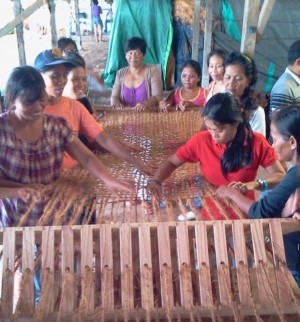PCA tie-up to open market for Mandaue coco waste products

Former scavengers in barangay Umapad are trained to make geo-nets at the Mandaue Coco Waste Processing Center. (CDN PHOTO/ NORMAN MENDOZA)
Locally-made geo-nets and other coco waste products will soon have more clients to buy them in the local market after the Mandaue Coco Waste Processing Center partnered with the Philippine Coconut Authority (PCA) to train the center’s scavenger employees.
The Coco Waste Processing Center had been in operation for more than a year and had been exporting activated carbon (charcoal made of coconut husk) to China.
The partnership will involve the PCA sending trainers to train these scavengers about what other products they can make out of coconut husks and supply them to other government agencies for environmental projects and private companies, said Dennis Andres, Division Chief III, OIC of PCA Region 7.
Earl Sanchez, the plant’s manager and son of the plant owner Edmund, formalized the partnership with PCA Central Visayas officials led by Andres yesterday.
The plant located near the barangay Umapad dumpsite has been processing coconut husk disposed by Profoods Company Inc. which processes export food products from coconut, pineapple, mango and others.
It has also been employing scavengers mostly women who seek additional income to support their family.
Andres said that geo nets or geo textiles are made of coco coir, twined manually and made into nets through an equipment.
Coconut husks are milled through the Decorticating machine that processes a thousand coconut husk per day. Fresh coconut husks are dried and matured in about 30 days before milling.
The coco waste processing center receives around 30,000 coconut husk per day from Profoods, just enough for a decorticating machine to operate a thousand husks each day.
Coconut waste can also produce coco pit (fertilizer) potting medium for plants, bio-locks for soil erosion like on a river rehabilitation program and even materials for construction like the Coir Cement Fiber Board, it can be used as an insulator and for roofing. It is a termite and fire proof material, said Sanchez.
The Coir Cement Fiber Board has been developed in the Zamboanga Research Center through Dr. Neil Melencion, the OIC Chief of Non-Food Products Development Division at PCA Zamboanga.
Engineer Ricardo Mendoza, head of the Solid Waste Management Office (SWMO) of Mandaue City, said geo-nets can be used in the riprapping of the Butuanon riverbanks when the river rehabilitation will start.
He added that the coir cement fiber board can also be used for the housing at the relocation sites of the Mandaue City government.
“It’s like hitting three birds with one stone as we have diverted waste as resource, it created livelihood to scavengers and the product can be used for environmental conservation.” Mendoza said about the coco waste processing plant.
Disclaimer: The comments uploaded on this site do not necessarily represent or reflect the views of management and owner of Cebudailynews. We reserve the right to exclude comments that we deem to be inconsistent with our editorial standards.
